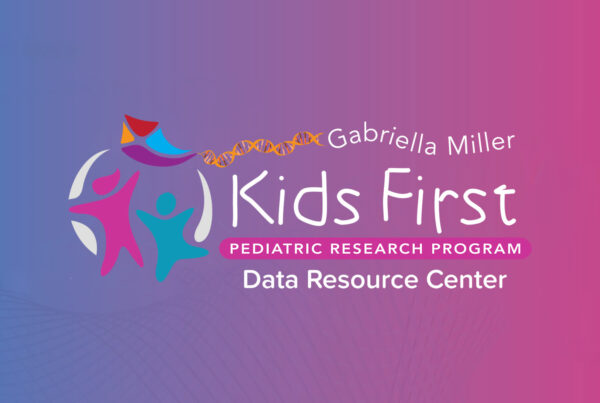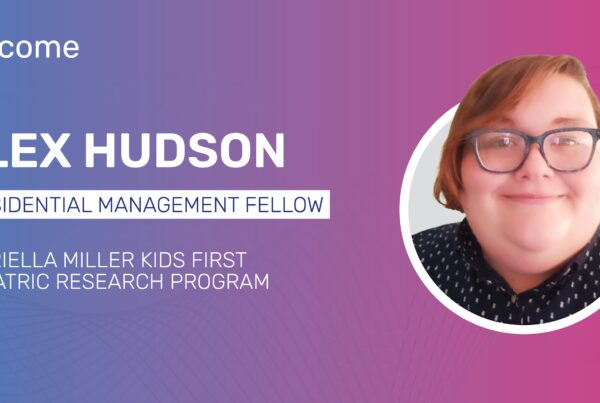Gabriella Miller Kids First Data Resource Center at the 2019 Annual Meeting of the American Association for Cancer Research
The Annual Meeting of the American Association for Cancer Research (AACR) covers the latest discoveries across the spectrum of cancer research—from population science and prevention; to cancer biology, translational, and clinical studies; to survivorship and advocacy—and highlights the work of the best minds in research and medicine from institutions all over the world. The AACR Annual Meeting attracts more than 22,500 attendees annually, and this year was held at the Georgia World Congress Center in Atlanta, GA from March 29 to April 3.
At this gathering of the world’s leading minds in adult and pediatric cancer research, the NIH Common Fund-supported Gabriella Miller Kids First Data Research Center (Kids First DRC) hosted an exhibition booth to bring awareness to the global cancer research community of the Kids First DRC’s genomic data related to childhood cancers, including the Pediatric Brain Tumor Atlas, and a Kids First dataset focused on the genetic risk of Ewing Sarcoma. The Kids First DRC also highlighted our overall cross disease research efforts, through which researchers can access whole genome sequence (WGS), whole exome sequence (WXS), RNA-Seq, and miRNA-Seq data across 10 datasets from Kids First, the Children’s Brain Tumor Tissue Consortium (CBTTC), and NCI’s Therapeutically Applicable Research to Generate Effective Treatments (TARGET) Initiative .
Additionally, the Kids First DRC presented three posters, with an additional poster on the Pediatric Brain Tumor Atlas presented by Kids First DRC consortia partner, the Children’s Brain Tumor Tissue Consortium. These posters were:
Presenters: Bailey Farrow, Kids First DRC Data Resource Portal Core; in collaboration with Kids First DRC Principal Investigator Allison Heath, PhD
Presenter: Yuankun Zhu, Kids First DRC Data Coordination Core
Presenter: Tatiana Patton, MS, Kids First DRC Administrative and Outreach Core
Presenter: Pichai Raman, PhD, Children’s Hospital of Philadelphia; Children’s Brain Tumor Tissue Consortium
Poster: The Pediatric Brain Tumor Atlas – Transforming the Landscape of Research
Biden Cancer Initiative Colloquia
The Kids First DRC engaged the Annual Meeting’s global research audience beyond the exhibitor floor as well. On Sunday, March 29, Kids First Principal Investigator and Alexander B. Wheeler Endowed Chair in Neurosurgical Research at Children’s Hospital of Philadelphia, Dr. Adam Resnick joined a panel of experts including Dr. Jamie Guidry Auvil, Director of the NCI Office of Data Sharing and member of the NIH Kids First Working Group, at the AACR-hosted Biden Cancer Initiative Colloquia to discuss the current progress being made within the cancer research field, why data sharing is a critical component to success, and how to build a cancer research system that patients need.
Appearing as keynote speaker for the event was former Second Lady Dr. Jill Biden, Co-Chair of the Biden Cancer Initiative along with her husband, former Vice President Joe Biden. Dr. Biden spoke of the profound impact that collaboration in scientific research has on finding cures, improving outcomes, and ending suffering of children and adults affected by cancer, saying, “You [researchers] are our best shield against this monster. You are discovering new ways to protect life. You are our hope.”
New Data Resource Portal Features
The Kids First DRC used the AACR Annual Meeting as an opportunity to unveil our newest Data Resource Portal features, including our new Explore Data feature (currently in Beta Phase)and File Entity Pages.
The Explore Data feature allows Data Resource Portal users to create virtual cohort studies with basic and advanced filtering across all Kids First datasets. Users can now create multiple queries in an easy-to-use visual interface that incorporates a variety of elements including study information, demographics, clinical data, biospecimens, and various file format types. This new feature keeps a running query history in a user’s dashboard and allows users to combine queries to perform set-like operations on queried results. As this feature develops further and moves out of Beta phase, additional functionality including Survival Plots and added search criteria will be incorporated.
Additional functional improvements to the Data Resource Portal that were shown at the Annual Meeting include new File Entity pages, which provide registered users with detailed views of specific genomic files so that they can explore file properties in a more in-depth manner over the Portal’s file browser. Genomic File IDs (represented as GF_####) are now clickable, bringing users to the File Entity page for that file.
DRC Focus Group
On March 31, the Kids First DRC hosted a focus group at AACR to gather direct feedback from approximately 20 users of the Kids First Data Resource Portal and associated workspaces, resources, and tools; to further inform the development of these new Portal features and identify priorities for the next round of portal/resource development.
The Kids First DRC demonstrated these new features and solicited direct input regarding how these features and existing DRC resources can address potential unmet needs of the pediatric cancer community, particularly in the context of cross-disease analyses.
Metrics of Success
Throughout the course of the four-day exhibition period, the Kids First DRC’s Administrative and Outreach Core (AOC) interfaced with over 150 conference attendees, comprised of laboratory scientists, bioinformaticians, clinicians, foundations, and patient advocates; as well as healthcare industry and public agency representatives. Conference attendees were most interested to hear about our new Data Resource Portal Explore Data feature, how to access data, and how to partner with the Kids First DRC in their research and patient advocacy efforts.
Over a two-day period, our poster presenters fielded questions from approximately 75 Meeting attendees, comprised primarily of students, researchers, pharma/healthcare industry representatives, foundations, patients, clinicians, and representatives from the National Institutes of Health (NIH) and the National Cancer Institute (NCI). Attendees were most eager to hear about our genomics harmonization and other workflow technologies, how to access data, and when the Data Resource Center will be adding additional data, including outcomes and treatment data, to the Portal.
Throughout the week-long event, the AOC laid out a robust social media strategy, which yielded significant awareness of the Kids First DRC’s involvement at the meeting, reaching a combined social media audience of nearly 21,000 Facebook, Twitter, and Instagram followers – a 154% increase in social media audience over our last major conference exhibition.
The Kids First DRC’s activity at the 2019 AACR Annual Meeting represents the latest efforts in the Kids First Administrative and Outreach Core’s long-term outreach strategy to foster research collaboration for the benefit of children world-wide. Through a multi-faceted outreach approach of digital communication strategies, focus groups and meetings, presentations, and exhibitions, awareness within the research and patient communities continues to grow. New users to the Kids First DRC website increased by 17% from the fourth quarter of 2018 to the first quarter of 2019, and subscribers to our Newsletter listserv increased by 24%.
With the release of new datasets, additions for current Kids First X01 datasets, and new collaborations across the childhood cancer and structural birth defect research landscape developing over the next several months, the Kids First DRC is well-positioned to bring increased awareness to these efforts and advance its mission toward easing the suffering of children everywhere.
To learn more and to register with the Kids First Data Resource Portal, visit kidsfirstdrc.org/portal/portal-features/










